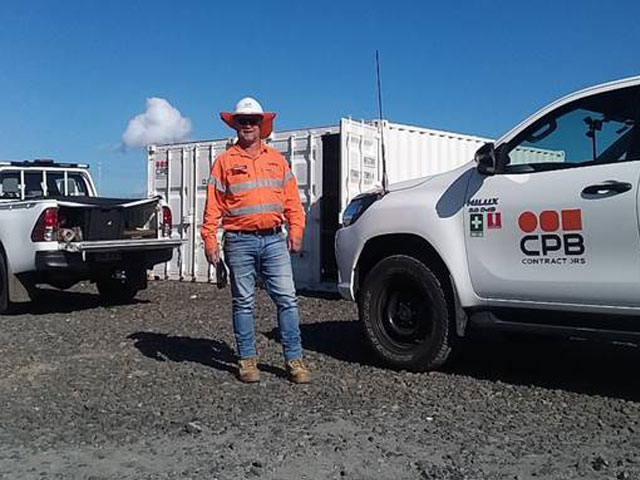CPB Contractors’ Cross River Rail RIS Site Supervisor Chris Buchanan spent his early years living in Mt Druitt, a suburb 38km north-west of Sydney that has one of Australia’s largest Indigenous urban populations.
Chris spoke to us about growing up as a young Indigenous man, the slow journey towards reconciliation and the delivery of CPB Contractors’ Reconciliation Action Plan.
Growing up in New South Wales
“I was in and out of trouble from an early age, bouncing from home to home, and school to school,” Chris says of his younger years, many of which were spent away from his six brothers and sisters.
“My mum was sick for many years so my Nan – a descendent of the Wiradjuri People from central New South Wales – raised me until I was seven.”
“We lived in Housing Commission, with little money. We were always struggling,” he said.
“Racism was common in those days, as were fights and altercations; it was what I was used to.”
Career in construction
After attending five schools in ten years, Chris went to Mt Druitt Technical College where he completed a 12-month pre-apprenticeship as a boilermaker before moving into carpentry, rigging and formwork (and later finding a place he really liked, in civil).
In 1985, when he was 21-years-old, he welcomed his first child, Sean, an arrival he fondly labels as a turning point in his life.
“Prior to this, I didn’t think I’d make anything of myself. Sean gave me a reason to find that purpose and be successful,” he said.
Chris went on to welcome another four children and after 26 years on the tools (and two knee replacements), he joined CPB Contractors as a junior foreman in October 2008 on the Northern Access Road Project, where he received the site’s annual award for ‘Best Teamwork’.
He has since worked on numerous CPB Contractors projects including the Eastern Busway Alliance project, Broadmeadows underground coal mine, Water Treatment Facilities in Miles, APLNG on Curtis Island, Moreton Bay Rail, Auckland’s Southern Corridor, Cooroy to Curra – Section C, the C17 Maintenance Aircraft Hangar at Amberley and Logan Enhancement Project.
Towards reconciliation
Now a Site Supervisor on the Cross River Rail RIS project, Chris says that while Australia has come a long way with reconciliation in recent years, it was important we continue to nurture and understand all cultures in Australia, including that of Aboriginal and Torres Strait Islander peoples.
“For many years, when people found out I was Aboriginal, they’d treat me different. It was like they thought I was less worthy and didn’t deserve anything,” Chris said.
“I’d get into arguments with people at the pub, or during a footy game. There was so much racism on the footy field. But that become the norm for me, and for us, as a team.”
“Then one day, things started to change. The apology to Australian Indigenous people in February 2008 was such a defining moment. I never thought that would happen; I was bewildered.”
In this together
“True to the 2020 National Reconciliation Week theme of being ‘In This Together’, our Prime Minister stood there that day and told Australia that he was not just sorry for past mistreatment, but that we were one team; that our future would embrace all Australians, whatever their origins. It was the momentum Australia needed to change.”
Chris said he was proud of how far we’d come – not only as a country but also as an organisation – with CPB Contractors launching its first Reconciliation Action Plan (RAP) in June 2019.
The plan was developed in close discussion with Reconciliation Australia and reflects CPB Contractors’ commitment to ensuring Aboriginal and Torres Strait Islander peoples share in and benefit from the training, employment and business opportunities our work and projects provide.
“The RAP, and the Group’s wider Social Inclusion Strategy will provide more inclusive opportunities for Aboriginal and Torres Strait Islander businesses, and people, in the construction industry in years to come,” Chris said.
“It also provides me with an opportunity to nurture and guide young Aboriginal and Torres Strait Islander people coming through our ranks. This is something I’d encourage everyone to do, regardless of your background.”
“Being Aboriginal is ‘who I am’, but I am just the same as everyone else.”
“Respecting my heritage is the same as respecting that of the next person beside you. And at the end of the day, our unique differences are what make us stronger together.”

